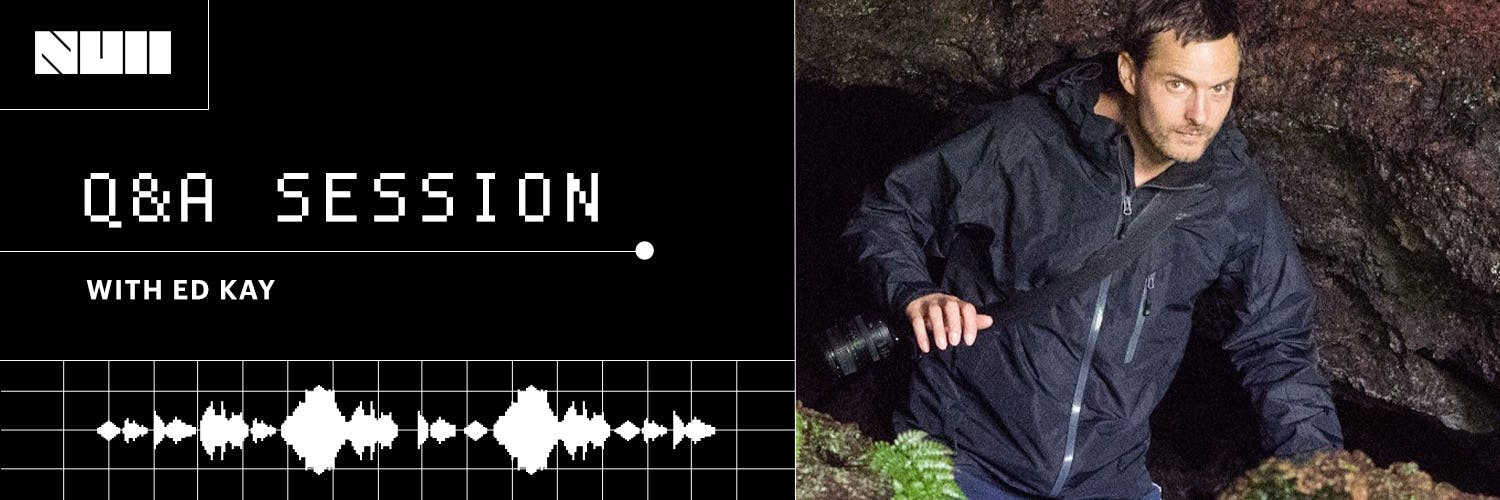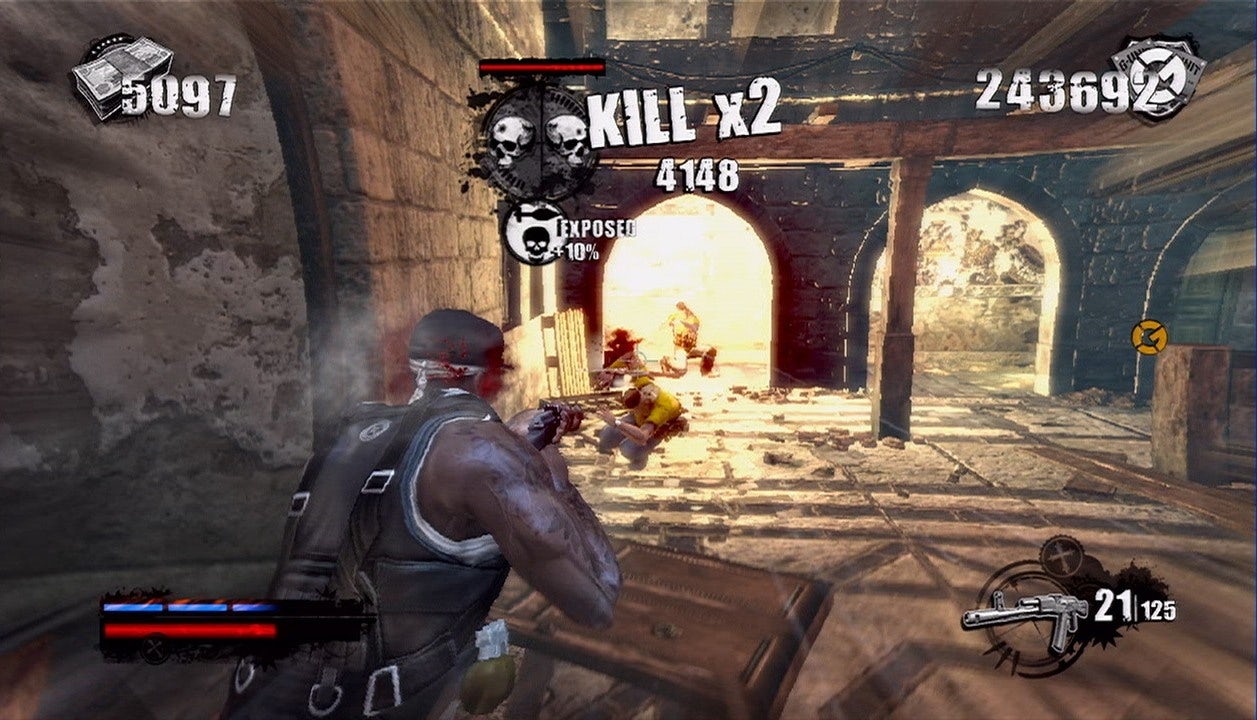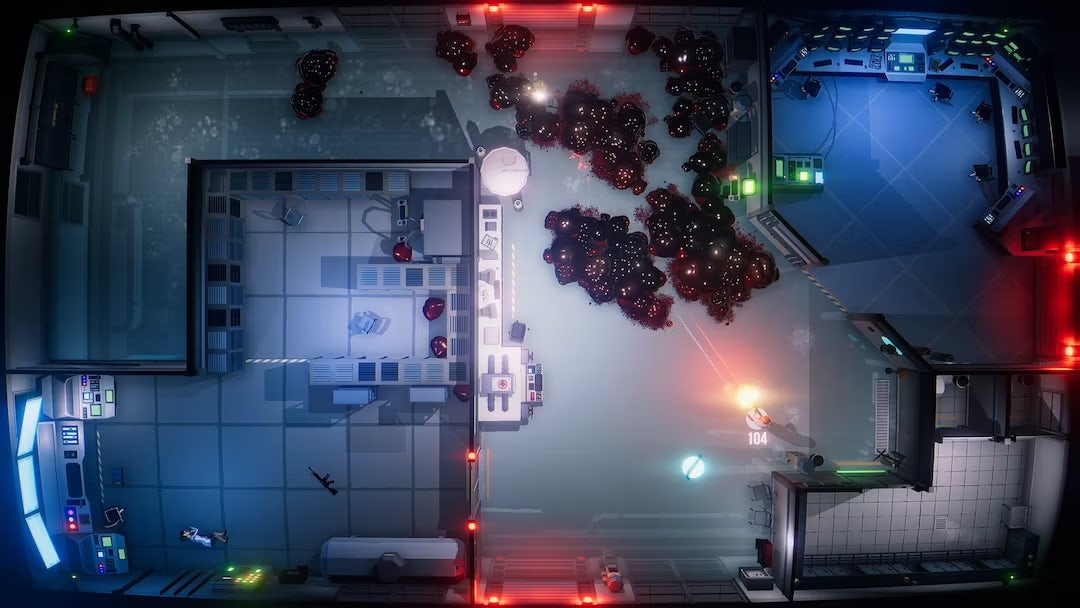
Null recently announced that we are publishing Demon Spore, developed by Ed Kay. I decided to sit down with him for a Q&A and about his background and how Demon Spore is coming along. -rorie
Matthew Rorie: How are you doing today?
Ed Kay: I’m good, how are you?
Matthew Rorie: Not too bad. It sounds like you moved around a bunch in your career, but where were you born and where did you first move for work?
Ed Kay: I was born in the UK in a tiny little village in Lancashire. And the first job I had was in Leamington Spa at Codemasters as a programmer, so that was kind of my start in the industry. But since then I've been around all over the place, to be honest.
Matthew Rorie: So you've been in the gaming industry since the early 2000s; did you really want to start out working in games? Or did you come in through another kind of back channel?
Ed Kay: Funnily enough when I was a kid, I remember I wanted to do special effects after watching the making of Jurassic Park and thinking it just looked like the coolest thing ever, to kind of figure out how to make these amazing effects happen with the most limited tools. I thought it was something that only the luckiest people get the opportunity to do. After college I was doing a little bit of summer work with an internship in a healthcare/IT company and I was bored out of my mind. But a friend of mine who had done the same Computer Science degree suddenly got a job in the games industry, I couldn’t believe it - this was something people can actually do! So I just applied to a bunch of companies, not expecting a lot, and then I ended up at Codemasters.
Matthew Rorie: So I have a couple generic questions for you. What is your favorite game of all time?
Ed Kay: That's incredibly hard. Can I give maybe a top three? I would go for the original XCOM, the original Half-Life, and Another World.
Matthew Rorie: I think the original XCOM was the first game I ever stayed up all night playing. I remember very specifically seeing the sun come through the windows and it was like, my goodness. So, what are you playing right now? You know, with all that free time you have while developing Demon Spore.
Ed Kay: So I'm notorious for playing games (and getting really excited about them) that everyone already played several years ago. The last thing I was playing was Inside, which is ridiculous how long it's taken me to get around to play, since I absolutely loved Limbo. I play loads of games for research, so I might not play the whole way through, I'll just be playing till I understand the main mechanics, but Inside I played just for pleasure and it was just absolutely amazing. The atmosphere, the world building, the environmental storytelling - just brilliant.
Matthew Rorie: I actually see some threads between Inside and Demon Spore. The monsters are similar in appearance. I get that the “monster” in Inside is obviously the player character, but we'll talk more about those kinds of connections a bit later.
So, you’ve been working on a bunch of different licensed games in your careers. I think a lot of people who are in the business for a certain amount of time are going to wind up working on something with a license, and you’ve worked on Call of Cthulhu: Dark Corners of the Earth, 50 Cent: Blood on the Sand, and Wanted: Weapons of Fate. Which is a weird one to me since they’ve been talking about making a sequel to that movie forever.
Ed Kay: No way!
Matthew Rorie: They've been trying for a very long time, although maybe they’ve given up by now. I think the rumor was that they were gonna try to bring back Angelina Jolie somehow which would be… difficult, knowing what happened at the end of that movie. But I did want to bring up 50 Cent: Blood on the Sand as it has a certain kind of reputation in places I’ve worked at in the past. I know that game had a kind of tortured development, where the license for that was kind of shunted onto it halfway through developing another game. The famous story from my old work was that helicopters had to be added to that game because 50 Cent's son really wanted them and he was, like, seven at the time. Is that true? And if so, is that the weirdest kind of thing you've ever had to add to a game based on somebody's request?
Ed Kay: Yeah, so I actually didn't know it was his son, but for sure there were multiple things aside from helicopters that were thrust onto that game. It was a very short development cycle. We were developing another game beforehand for about a year. So that game was in the early stages, we were building a kind of spy game, and suddenly the publisher got this opportunity to work with the 50 Cent IP and so we had to change course.
Matthew Rorie: Sure.

Ed Kay: We had this very tight timeline, everything was planned and organized to fit into that time line. And we were pushing ahead, doing okay, keeping just about on time with the deadline and then suddenly the first request came. If I remember correctly, it was because 50 Cent had watched the movie Blood Diamond and he really liked the car chase sequence from it and therefore wanted basically a car sequence in the game. Obviously, when you're making a game that is about people running around in third person and shooting things, suddenly to add a vehicle in and vehicle physics and all the rest of it - it was absolutely bananas. Then shortly after that he asked for a level where you fly a helicopter. And I actually had to build that. It was basically me and I think one or two other people and we weren't allowed to use other resources, for visuals or models or anything because the schedule was too tight. So that level is a complete hack. That's why it's an on-rails sequence because there was absolutely no way we could do anything else more complex.
There were all sorts of insane things in that level like stealing little vehicle animation sequences from other levels and hammering them into other places. And then because you're mowing people down with a minigun, and we had a super strict character limit, probably like six or seven characters on screen max, we literally had to just constantly recycle people. As soon as one was shot it’d disappear and we’d have to spawn another one immediately round the corner. Crazy stuff like that.
Matthew Rorie: Some people really like to have restrictions on resources to be forced into finding creative solutions to problems, but I think in video games very few people really find that to be the case. But at any rate I can promise you that people are still talking about that game many years later. The other game that I really was curious about was Bulletstorm. So you were the lead gameplay designer on that, and it’s had a bit of an interesting afterlife. It had an interesting reception at the time because of how over the top it was, but people really did seem to have a fun time with it. I really enjoyed playing it a bunch and now it has a remastered edition, and now a VR version as well. So that was a really kind of unique game in terms of the gameplay, the way everything tied together with shooting and the lasso and the kicking. It’s interesting that it’s still a game that people are remaking even today.
Ed Kay: That game had a super solid core combat loop. I think the skill system rewarding you for doing crazy kills was key, then there’s mechanics for leashing people towards you, and being able to kick people which would throw them way up into the air and so on: the mechanics all bound together really well and rewarded you for doing completely over the top stuff. A lot of those systems were in there when I moved on to the project but I definitely had a lot of input into how they turned out because it was something that needed a lot of tuning to fit in with all the other things in the game, like the hazards that you would bash people into. And it was a really fun game to work on, to be honest. I think the game when it came out did probably a bit less well than we would’ve liked, because there's some reviews that didn't quite appreciate some of the more juvenile aspects of the game, like the dialogue.
Matthew Rorie: Sure.
Ed Kay: It was about that point where basically if you didn't have an open world game or something that took a lot more time and had a lot of replayability, it just wasn't economically very viable anymore at that point. So that, combined with some reviews that weren't so keen on certain aspects of its tone, it didn't hit as hard as people expected. But then, because the gameplay was really solid, it definitely got a lot of love afterwards, for sure.
Matthew Rorie: That's good. I'm curious about the VR version. So you eventually made the shift from working on large teams to being a solo dev and you're written about that before. I read your article on game developer about the making of Hang Line as the first solo game that you made. I know that was a long development; what lessons did you take from Hang Line to Demon Spore?
Ed Kay: Basically everything! But I would say the most important stuff would be just learning how to kind of architecture your systems. I learned how to make systems that can fit together and interact with one another in many ways. In Hang Line, it's a fairly simple game but there's a lot of physics elements that can combine together in a pretty interesting way e.g. the wildlife in the world will react to a number of different things when triggered. So the mountain cat will jump at the player, but if you knock a goat near it then it will also jump at the goat which would then go tumbling off and maybe hit a stalactite, which could then fall onto an explosive and all of sudden you’ve got quite an interesting gameplay moment.
And I think that aspect of the programming, trying to make really emergent systems, that is something that I've definitely, really brought forward onto Demon Spore. These are the kinds of games I'm interested in. I absolutely love it when I'm working on a game and maybe I've been working on it for a while and suddenly I see something that I've never seen before which I didn't specifically program. That’s just such a satisfying feeling.
Matthew Rorie: So speaking of, Demon Spore is coming out next year. The story revolves around your character developing a kind of a cure for world hunger, and then things go very wrong and a tentacle monster is created. I know you've mentioned 80s horror movies, as kind of an inspiration for it, especially The Thing. Was there any other film in particular that really influenced you?
Ed Kay: Yeah, definitely The Thing was a massive one. But I mean I always loved those kinds of sci fi movies from the 80s, stuff like Aliens, Predator and Leviathan. I also really love the Korean horror movie The Host, which kind of has that tone where it's quite scary, and there's some really exciting thrilling moments, but it also has a little spots of humor in there. But to be honest there was quite a practical kind of reason for going in the direction I did. Originally the game was a simple arcade retro shooter and it didn't really have a theme. It was just triangles basically, a bit like Geometry Wars. But after working on it quite a bit, I started to realize that it was becoming a pretty big thing so I started to do a lot of market analysis to try and see if there was a market for this kind of game. I realized that it was probably not a good idea to just kind of bang it out as it was since retro arcade shooters just don't really sell that well, and I'd already invested quite a lot into it at this point. That was when I decided from a practical perspective to put a theme to it and create something that people can connect with and be immersed in, and have a more compelling draw in terms of screenshots and trailers.

I worked the lab environment into it because essentially I just needed something that would work on a room by room basis, because that was how the core gameplay worked. So, there were lots of practical things that kind of led to it becoming this lab escape scenario. And because I absolutely love those kinds of 80’s sci-fi and monster movies it was a perfect opportunity to put that kind of love into the game because it already fitted into that mold so well. Especially because it was about this creature just getting bigger and bigger and growing even more deadly as you go along. So it just kind of all fitted together very organically.
Matthew Rorie: So what, if you had to pick one thing and I don't mean to put you on the spot, but have there been any noticeable challenges? I guess you've already talked about trying to adapt the game for the market. Was there anything else?
Ed Kay: Yeah, I would say developing the art style for the game was really challenging because I'm a game designer by vocation. So making the visuals, especially the creature’s visuals, was super challenging because I've not really done that kind of work much before. You know, the artistic side of it, getting all the colors right, making sure there's lots of variety between the environments but also getting the important elements to stand out, and then creating a mood and an atmosphere.
Also, getting all of the lighting working well, figuring out just all this technical stuff like what post-processing effects to use, and how to make the lights work with the post-processing, and the shaders...I've never done shaders before and that was something that just seemed to make a lot of sense for building the creature because it's completely dynamic. So, yeah, let’s say there are a lot of challenges both from the technical side and the artistic side.
Matthew Rorie: So on the flip side, I assume in game development or any creative endeavor that there are always moments of panic, like, “this game will never work.” Is there a moment where that kind of flipped on his head? And it actually became something that you really thought would be a successful game?
Ed Kay: There was certainly lots of anxiety for a long time. Kind of when you realize you've worked on something for a while and ideally it needs to make some money because you want to keep doing what you're doing. But I think the point when I did the original reveal on Pitch Ya Game, which was just that little trailer that was literally just one room because that's what I had at that point, that really blew up and kind of went viral. At that moment I was like, “okay, people are interested in this and it's not just a random shot in the dark.” People were interested in this sort of theme and this kind of gameplay and lots of people seemed to love tentacles. And after that I was like, “okay, I'm on to something. I don't need to panic as much anymore!”
Matthew Rorie: So for anyone reading this, you’re referring to the Pitch Ya Game awards, one of which you received all the way back in November of 2021 for an early trailer for the game. Awards are nice. I hope you frame that on your wall!
You’ve got a while left to work on Demon Spore before its release. What are the last few big hurdles for you? Is it mostly polish at this point? Or are you going to be looking to do any more core kind of gameplay changes at all?
Ed Kay: There are definitely some challenges left for the game. I think the biggest one is really just seeing how the whole metagame fits together, the whole progression system, because I've got some components that are still missing and you never really know how the whole game will feel until all those systems are in and all of them are working together and feeding into each other. There’s not a lot of time left to work on it, so that’ll be challenging for sure. But I’m sure it’ll be super cool when I’m done!
Demon Spore will be released in 2024. You can wishlist it on Steam here, check out the trailer here, or join the official Discord here.


